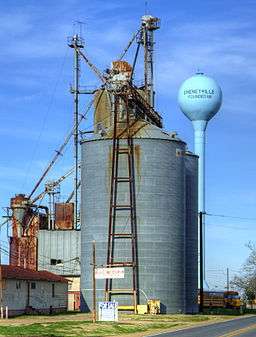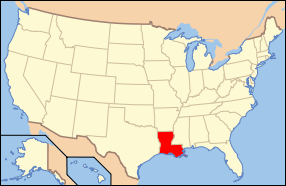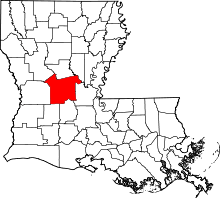Cheneyville, Louisiana
| Town of Cheneyville | |
| Town | |
 | |
| Country | United States |
|---|---|
| State | Louisiana |
| Parish | Rapides |
| Elevation | 66 ft (20.1 m) |
| Coordinates | 31°00′48″N 92°17′22″W / 31.01333°N 92.28944°WCoordinates: 31°00′48″N 92°17′22″W / 31.01333°N 92.28944°W |
| Area | 1.0 sq mi (2.6 km2) |
| - land | 1.0 sq mi (3 km2) |
| - water | 0.0 sq mi (0 km2), 0% |
| Population | 901 (2000) |
| Density | 863.9/sq mi (333.6/km2) |
| Mayor | Derrick Johnson (D) |
| Timezone | CST (UTC-6) |
| - summer (DST) | CDT (UTC-5) |
| Area code | 318 |
|
Location of Cheneyville in Louisiana
| |
 Location of Louisiana in the United States
| |
Cheneyville is a town in Rapides Parish, Louisiana, United States. It is part of the Alexandria, Louisiana Metropolitan Statistical Area. The population was 901 at the 2000 census.
History
The town was named for settler William Cheney.[1]
Cheneyville is significant in the history of the Restoration Movement associated with Alexander Campbell. In 1843 most of the membership of a Baptist congregation, under the leadership of William Prince Ford, who had been influenced by Campbell's writings, became a Church of Christ. The Cheneyville Christian Church is the oldest congregation associated with the Restoration Movement in Louisiana. In 1857, Campbell visited the congregation and was favorably impressed by its fellowship between the races.[2]
Ford is also known as the original slavemaster of Solomon Northup, the main character in the feature film, Twelve Years a Slave. Northup was an African-American who had been born free, but kidnapped in Washington, DC and sold to Ford in New Orleans in 1841.
Notable people
- State Senator C. H. "Sammy" Downs lived in Cheneyville, where his son, the retiring veteran Rapides Parish District Attorney, James C. "Jam" Downs, was born. Sammy and Jam Downs also lived in Alexandria, where they practiced law. Jam Downs currently lives in a restored farmstead in Lecompte.[3]
- Wilbur Dyer, state representative from south Rapides Parish from 1974 to 1980[4]
- Historian Sue Eakin, author and editor of Twelve Years a Slave, is interred at Cheneyville in the Trinity Episcopal Church Cemetery.[5]
- The Cheneyville sugar planter and Louisiana State Representative Neil Haven Klock is also interred at Trinity Cemetery.[6]
- Louisiana physician and politician Alvan Lafargue practiced medicine in Cheneyville after 1910.[7]
- Robert J. Munson, state representative from Cheneyville, 1956 to 1973; interred at Trinity Episcopal Cemetery[4][8]
- Leroy Augustus Stafford, a Rapides Parish planter and brigadier general in the Confederate Army who was mortally wounded at the Battle of the Wilderness in May 1864, was born in 1822 at Greenwood Plantation near Cheneyville. His son, David Theophilus Stafford, also a Cheneyville native, was the sheriff of Rapides Parish sheriff from 1888 to 1904 and subsequently the Louisiana adjutant general from 1904 to 1912.[9]
Geography
According to the United States Census Bureau, Cheneyville has a total area of 1.0 square mile (2.6 km2), all of it land.
Demographics
| Historical population | |||
|---|---|---|---|
| Census | Pop. | %± | |
| 1910 | 498 | — | |
| 1920 | 678 | 36.1% | |
| 1930 | 835 | 23.2% | |
| 1940 | 913 | 9.3% | |
| 1950 | 918 | 0.5% | |
| 1960 | 1,037 | 13.0% | |
| 1970 | 1,082 | 4.3% | |
| 1980 | 865 | −20.1% | |
| 1990 | 1,005 | 16.2% | |
| 2000 | 901 | −10.3% | |
| 2010 | 625 | −30.6% | |
| Est. 2015 | 608 | [10] | −2.7% |
As of the census[12] of 2000, there were 901 people, 267 households, and 183 families residing in the town. The population density was 863.9 people per square mile (334.5/km²). There were 314 housing units at an average density of 301.1 per square mile (116.6/km²). The racial makeup of the town was 33.07% White, 65.70% African American, 0.33% Native American, 0.55% from other races, and 0.33% from two or more races. Hispanic or Latino of any race were 2.33% of the population.
There were 267 households out of which 28.5% had children under the age of 18 living with them, 39.7% were married couples living together, 26.2% had a female householder with no husband present, and 31.1% were non-families. 28.5% of all households were made up of individuals and 14.6% had someone living alone who was 65 years of age or older. The average household size was 2.71 and the average family size was 3.39.
In the town the population was spread out with 24.0% under the age of 18, 10.2% from 18 to 24, 30.4% from 25 to 44, 22.6% from 45 to 64, and 12.8% who were 65 years of age or older. The median age was 36 years. For every 100 females there were 103.8 males. For every 100 females age 18 and over, there were 102.1 males.
The median income for a household in the town was $19,044, and the median income for a family was $21,917. Males had a median income of $21,250 versus $12,159 for females. The per capita income for the town was $10,244. About 29.4% of families and 43.9% of the population were below the poverty line, including 46.2% of those under age 18 and 27.0% of those age 65 or over.
References
- ↑ "Profile for Cheneyville, Louisiana". ePodunk. Retrieved 2010-06-14.
- ↑ Tryggestad, Erik (2014-02-27). "Oscar contender '12 Years a Slave' has ties to Restoration Movement". Christian Chronicle. Retrieved 2014-02-28.
- ↑ "Rick, Markway, "The Prosecutor: District Attorney James Crawford 'Jam' Downs"" (PDF). lwaa.org. Retrieved June 27, 2013.
- 1 2 "Membership in the Louisiana House of Representatives, 1812-2016: Rapides Parish" (PDF). house.Louisiana.gov. Archived from the original (PDF) on October 6, 2014. Retrieved December 22, 2014.
- ↑ "Obituary of Sue Lyles Eakin". melanconfunerals.com. Retrieved 3-September 21, 2009. Check date values in:
|access-date=(help) - ↑ "Neil Haven Klock". findagrave.com. Retrieved October 23, 2014.
- ↑ "Lafargue, Alvan Henry". Louisiana Historical Association, A Dictionary of Louisiana Biography. Retrieved February 17, 2011.
- ↑ "Robert J. Munson". findagrave.com. Retrieved December 22, 2014.
- ↑ "David Theophilus Stafford and Leroy Augustus Stafford". Louisiana Historical Association. Retrieved August 25, 2014.
- ↑ "Annual Estimates of the Resident Population for Incorporated Places: April 1, 2010 to July 1, 2015". Retrieved July 2, 2016.
- ↑ "Census of Population and Housing". Census.gov. Archived from the original on May 11, 2015. Retrieved June 4, 2015.
- ↑ "American FactFinder". United States Census Bureau. Archived from the original on 2013-09-11. Retrieved 2008-01-31.
